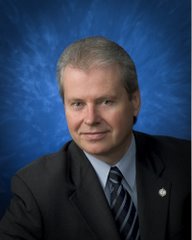As a Conservative, I cannot
let pass without comment, the death of Charlie Kirk. It was a most tragic and
horrendous murder, seen before a crowd of three thousand and recorded on video.
My shock and dismay were similar to when we heard that Princess Diana died in a
car accident, or the horror of watching the Islamist airplane attack in New York.
Charles James Kirk (Oct 14,
1993 – Sept 10, 2025 – 31yrs) was an American conservative political influencer,
author, and media personality. On Wednesday, Charlie was assassinated during
his speaking event at Utah Valley University. He was speaking outdoors for his
American Comeback Tour, when he was shot in the neck by the assailant from the
roof of a building about 200 yards away. Kirk is survived by his wife and two
children, who are both under the age of 3.
Kirk co-founded the student
organization ‘Turning Point USA’ in 2012 and was its executive director. He was
the chief executive officer of ‘Turning Point Action’ and a member of the
Council for National Policy. In recent years, he was a prominent voice on
university campuses for the political MAGA movement of the Republican Party. He
was a critic of legacy mainstream media and participated in the USA culture
battles over race, gender, immigration, and social values.
Those are the traditional credentials
ascribed by the media, but increasingly he developed into a Christian apologist
and persuader in his public appearances. He was a bold and deliberately
provocative populist social commentator. He made declarations, that when reported
out of context, enraged the political left. He once said he wanted to transform
the culture.
Although he did not claim
academic credentials, in debate, he often embarrassed those who presented themselves
as such when verbally challenging him. He would respond with real data, which
discredited his challengers, while he posed irreconcilable questions to his verbal
opponents.
Charlie has been called
derogatory names by left-wing community leaders. The vilification of Charlie
and his national youth movement has become the norm in so-called progressive
social circles. These voices of evil have no bounds. They couldn't abide his
boldness in asserting the value of traditional Biblical social standards. The
alternative media have also been documenting the evidence of prominent people
who have stated that Charlie Kirk got what he deserved and was the author of
his own demise.
In contrast, the 2,460 seats
in the Kennedy Center were full to honour Charlie Kirk on Sunday evening, Sept
14. Attendees packed the Concert Hall of the John F. Kennedy Center for the
Performing Arts in Washington, DC, to pay tribute. Remarks from several
speakers, including HHS Secretary Robert F. Kennedy Jr. and White House Press
Secretary Karoline Leavitt, drew a warm response from the audience.
Hundreds of people outside of
Sunday's event streamed the prayer vigil on their phones, as they were unable
to get into the venue, which was packed to capacity. The event both started and
concluded with a worship service, a testament to Kirk's Christian faith.
US House of Representatives
Speaker Mike Johnson was the first speaker. Johnson said that Kirk loved a
vigorous debate, but he loved people more. Charlie was never motivated by hate,
Johnson noted.
White House Press Secretary
Karoline Leavitt, following Johnson, recounted her time as a congressional
candidate in New Hampshire in 2022. At the age of 25, she recalled the help
Kirk offered her as a young female candidate. She said that when Washington
Super PACs poured money into the opponent's campaign, Charlie and his team
encouraged me to finish the campaign.
Director of National
Intelligence Tulsi Gabbard, speaking after Leavitt, said that Charlie lived by
the principle that no matter how horrible a person's speech may be, their ideas
must be defeated only by better ideas.
One of the most vocal
responses from the crowd came as Health and Human Services Secretary Robert F
Kennedy Jr. talked about Kirk's impact on a member of his family, his niece,
who packed a bible in her suitcase while heading off to college in Europe so that
she could 'live like Charlie Kirk.' Over 85 members of Congress were in
attendance at the vigil.
One of the young attendees,
James, 22 of Great Falls, Virginia, told the Daily Mail at the Kennedy Center
that one thing he learned from Charlie Kirk was that 'he wanted a very civil
country where we could all voice our opinions, regardless of what side we are
on.' Another Virginian, Andrew, 24,
shared a similar sentiment with the Daily Mail, adding that a lasting element
of Kirk’s legacy is that he was willing to talk to anyone, regardless of party
or ideology.
There will be a large memorial
gathering on Sunday, Sept 21, at the State Farm Stadium in Glendale, Arizona,
attended by the President and national leaders.
Charlie Kirk’s Christian
theology was traditional American evangelical. Kirk’s pastor, Rob McCoy of
Godspeak Calvary Chapel in Newbury Park California said, “My friend Charlie
Kirk was murdered today by a coward.” “Charlie’s
life will be remembered for many wonderful things.” "This truth allowed Charlie to face
every threat with courage because he didn't fear death," McCoy added. "All
evil knows is death, and they derive power from death. “Charlie lived for life
and will be remembered for this.” “My heart is broken for his family; his wife
Erika and his two precious children.” "Evil has not prevailed, and it will
not win," concluded McCoy.
Charles Kirk built an
organization and movement, all with the power of the spoken word. He never alluded
to violence against his harsh critics, even though he was threatened every day
with violence by those who couldn’t contend with logic and truth. His enemies
have done what evil always does; it takes away life.
Despite his evangelical Christian
leanings, Charlie Kirk retained a sympathy with Catholicism. He participated in
discussions about Catholic theology, though he expressed reservations about some
Church doctrines. He was generally uncomfortable with denominational
distinctives. He reflected a common evangelical perspective that prioritizes
individual spiritual relationship with Jesus, over institutional and
denominational authority.
Kirk’s work through ‘Turning
Point Faith’ brought him into contact with varied religious communities. That
organization collaborated with more than 3,700 congregations to encourage what
it termed “biblical citizenship.” He had a rather ecumenical and
non-denominational approach to conservative politics.
Charlie Kirk’s religious views
evolved over time. In his earlier years, he advocated for the separation of
church and state, but his rhetoric increasingly embraced religious themes as
his career progressed. He came to describe political contests as
"spiritual battles" and elections as "civilization-defining"
events. This framing reflected his growing conviction that cultural and
political transformation required a spiritual foundation. He understood that it
takes more than politics to build a great society.
‘Turning Point Faith’, which
he founded in 2021, was dedicated to recruiting pastors and church leaders to
be active in local and national political issues. Kirk’s religious perspective
ultimately prioritized cultural influence over theological precision. His
approach could be described as 'theistic nationalism'—a belief that America's
identity is inherently tied to Judeo-Christian values that need protection from
secular forces. He viewed different Christian traditions primarily through
their utility in advancing conservative political goals rather than their
theological distinctions. This pragmatic approach allowed him to work across
denominational lines while maintaining his own private theological identity.
Through ‘Turning Point Faith’, Kirk aimed to mobilize the religious community
to engage in political issues, promoting what he termed 'biblical citizenship'.
In May 2021, Kirk married
Erika Kirk (née Frantzve), a businesswoman and podcaster who won the Miss
Arizona USA pageant competition in 2012. The couple's first child, a daughter,
was born in 2022. Their second child, a son, was born in May 2024. We grieve
for the family, as he was a son, a husband, a father, and a defender of the
traditional family and its values.
Erika comforted her husband's
thousands of followers with a courageous talk on national television. She pledged
that Charlie’s work would carry on, perhaps even in greater form.
Meanwhile, authorities are
piecing together the culture affiliated with the shooter, as he did not act in
isolation. The climate of conspiracy and the broader circles of condonation are
being revealed.
The media and cultural world
have said Charlie Kirk was a political assassination victim. My perspective is
that, in view of his work in the last year, he was a religious martyr in the
sense that he was killed not for who he was, but for what he proclaimed. It is
similar to the historical concept of religious martyrdom, where individuals are
persecuted and killed for their religious beliefs.
The early persecution of
Christians in the Roman Empire left a lasting impact. It fostered a culture of
martyrdom, with many Christians choosing to die for their faith rather than
renounce it. It also helped establish Christianity as a counter-cultural
movement that challenged the established order, and that legacy continues.
The public horror for Charlie reminds
us of the sacrifice and courage of those who went before us, and inspires us to
uphold the values of truth, righteousness, and religious freedom today. It is
our responsibility to carry on his legacy and ensure that his values continue
to guide our actions.
Proverbs 14:34 KJV
Righteousness exalteth a nation: but sin is a reproach to any people.
God-devotion makes a country
strong; God-avoidance leaves people weak.
Living according to God’s
instructions makes a nation great, but sin colours those who commit it with
disgrace.










2 comments:
I think I understand Charlie's heart. Based on the many videos I have seen, Charlie would be praying for the shooter, trusting he would seek God’s forgiveness for his life of sin, and that one day he would join Charlie in heaven. That was the character of Charlie’s central message. When so called heroes of the “leftie-woke-progressive” culture were hurt, they became violently enraged by the event. We saw the riots in the streets, arson fires, vandalism and looting everywhere. In stark contrast, when a Christian Conservate was murdered, there was only prayer, called moments of silent commemoration, flags at half mast, emotional songs written, and group huddles of prayerful love. That is the evidence of the underlying driving spirit of the divided camps. Also the media talk given by the widow was astounding.
Thanks for such a balanced fair post. His recent major emphasis on cultural change through personal spiritual enlightenment was revealing. The cruel heartlessness of some in their postings in response to Charlie’s death is disturbing. It is now evident more than ever, that there are evil people in this world. The smug haughty sarcasm from some reveals the path of hell they are on.
Post a Comment